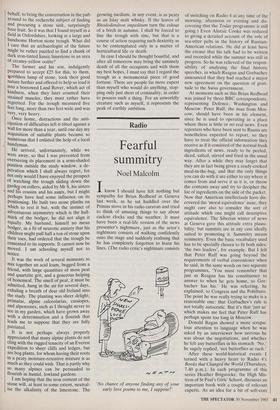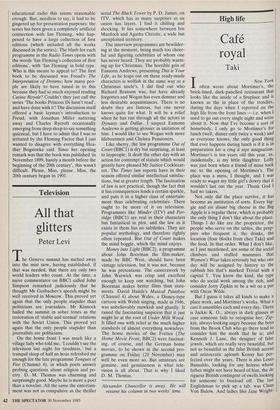Radio
Fearful summitry
Noel Malcolm
Iknow I should have felt nothing but sympathy for Brian Redhead in Geneva last week, as he sat huddled over the Primus stove in his radio caravan and tried to think of amusing things to say about cuckoo clocks and the weather. It must have been a real-life version of the news presenter's nightmare, just as the actor's nightmare consists of walking confidently onto the stage and suddenly realising that he has completely forgotten to learn his lines. (The radio critic's nightmare consists 'No chance of anyone finding any of your early love poems to me, I suppose?' of switching on Radio 4 at any time of the morning, afternoon or evening and dis- covering that the Today programme is still going.) Even Alistair Cooke was reduced to giving a detailed account of the role of sea-otter pelts in the history of Russian- American relations. He did at least have the excuse that his talk had to be written and recorded while the summit was still in progress. So he was relieved of the respon- sibility of analysing the final historic speeches, in which Reagan and Gorbachev announced that they had reached a major new agreement on the question of grati- tude to the Swiss government.
At moments such as this Brian Redhead was joined by three BBC correspondents, representing Defence, Washington and Moscow. Peter Ruff, the man from Mos- cow, should have been in his element, since he is used to operating in a place where there is little or no real news. Even reporters who have been sent to Russia are .nonetheless expected to report, so they have to treat the official information they receive as if it consisted of the normal fresh ingredients of news, ready to be peeled, diced, salted, stirred and fried in the usual way. After a while they may forget that they are in fact being given a ready-cooked meal-in-the-bag, and that the only things you can do with it are either to say where it comes from and serve it as it is, or throw the contents away and try to decipher the list of ingredients on the side of the packet. Now that American intellectuals have dis- covered the 'moral equivalence' issue, they might care also to consider the sort of attitude which one might call descriptive equivalence. The Siberian winter of news at Geneva gave this attitude extra plausi- bility; but summits are in any case ideally suited to promoting it. Summitry means symmetry. Even the basic vocabulary used has to be specially chosen to fit both sides: 'the two leaders', for example. But I felt that Peter Ruff was going beyond the requirements of verbal convenience when he said, in the same words on two separate programmes, `You must remember that just as Reagan has his constituency to answer to when he gets home, so Gor- bachev has his.' He was referring, he explained, to Congress and the Politburo. The point he was really trying to make is a reasonable one: that Gorbachev's rule is not totally autocratic. But it's that 'just as' which makes me feel that Peter Ruff has perhaps spent too long in Moscow.
Donald Regan showed a more scrupu- lous attention to language when he was asked by an interviewer how nervous he was about the negotiations, and whether he felt any butterflies in his stomach. 'No,' he sagely replied, 'not butterflies as such.'
After these world-historical events I turned with a heavy heart to Radio 4's Books that Changed the World (Thursdays, 7.40 p.m.). In each programme of this series Heather Brigstocke, the High Mis- tress of St Paul's Girls' School, discusses an important book with a couple of relevant experts. As an idea for a bit of soft-core educational radio this seems reasonable enough. But, needless to say, it had to be gingered up for presentation purposes: the series has been given a completely artificial connection with Ian Fleming, who hap- pened to have a large collection of first editions (which included all the works discussed in the series). The blurb for each programme in the Radio Times opens with the words 'Ian Fleming's collection of first editions', with 'Ian Fleming' in bold type. Who is this meant to appeal to? The first book to be discussed was Freud's The Interpretation of Dreams; how many peo- ple are likely to have tuned in to this because they had so much enjoyed reading Casino Royale? Couldn't they just call the series 'The books Princess Di hasn't read', and have done with it? The discussion itself offered a basic layman's introduction to Freud, with Jonathan Miller nattering away and Charles Rycroft occasionally emerging from deep sleep to say something quizzical, but I have to admit that I was so irritated by the Fleming Factor that I just wanted to disagree with everything Hea- ther Brigstocke said. Since her opening remark was that the book was published 'in November 1899, barely a month before the beginning of the 20th century', this wasn't difficult. Please, Miss, please, Miss, the 20th century began in 1901.



























































 Previous page
Previous page